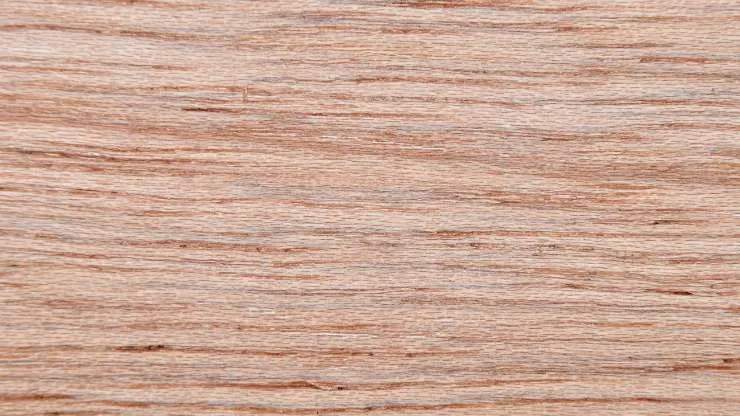Mahogany is undoubtedly one of the most popular tonewoods around. But its higher price can mean it’s out of reach for many guitar players. Enter meranti. In this article, we’ll examine meranti as a tonewood, explore its use in guitars and tonal characteristics, and answer the question: is meranti a good alternative to mahogany?
What is Meranti Wood?
Meranti, also sometimes known as Philippine mahogany, is a tropical hardwood that originates from Southeast Asia. It isn’t actually one species of wood, but rather the name meranti can refer to multiple members of the Shorea genus. Depending on the species, meranti wood can come in various colours, from pale yellow to dark red-brown. It’s a highly versatile wood with multiple applications, such as furniture, decking, doors, windows, and boat building. Some of the most common varieties include:
- Dark red meranti – deep red or purple in colour, dark red meranti is relatively durable and has a coarse texture and straight or interlocked grain.
- Light red meranti – less durable than dark red meranti, light red meranti is typically pale brown in colour, has a nicer finish, and is easy to work with.
- White meranti – white meranti offers a pale yellow colour, which matures into more golden tones with age. It’s a lightweight wood that, while easy to work with, can have a significant blunting effect on tools due to its higher silica content and hardness relative to other types of meranti wood.
- Yellow meranti – Accounting for several species in the Shorea genus, yellow meranti is typically lightweight and durable, with a coarse texture and reasonably large pores.
What’s the Difference Between Meranti and Mahogany?
Mahogany is a highly sought-after wood species known for its rich, warm colour and durability. It’s a popular choice for high-end furniture and musical instruments. But, with rising concerns over the sustainability of mahogany, meranti has emerged as a viable alternative.
The main difference between meranti and mahogany is their origin. While mahogany is native to Central and South America, meranti comes from Southeast Asia. Mahogany also has a more consistent colour and a tighter grain pattern, while meranti tends to be more varied on both counts, especially as the name refers to wood from several different species.
How Is Meranti Used in Guitars?
Meranti is becoming a popular tonewood choice, particularly in the budget guitar segment. Due to its similar physical properties, it has especially found favour amongst guitar makers looking for a low-cost mahogany substitute. Meranti is easy to work with and is (currently) readily available, helping to keep the cost of production low.
Meranti is an option for the back and sides of acoustic guitars, where its balanced tonal characteristics provide a steady base with warm and rich tones. It can also be used for guitar tops, although this is uncommon. The guitar top is responsible for producing volume and tone, and meranti’s less intense projection means that mahogany is still a more popular choice for this component.
In electric instruments, meranti makes an excellent low-cost choice for guitar bodies, although it isn’t strong enough to feature anywhere else in guitar construction.
How does Meranti Tonewood Sound?
Meranti is known for possessing a fairly neutral tone profile with a subtle warmth that’s vaguely similar to mahogany. Meranti’s tonal characteristics are well-balanced across the frequency spectrum, with a decent midrange. The bass response is not as pronounced as in mahogany, but it is still present and adds a little depth to the guitar’s overall sound.
Meranti’s tonal properties make it ideal for genres that require warm and rich tones, such as blues, jazz, and folk. However, it may not be suitable for genres that require a bright and cutting sound, such as rock or metal.
Are Meranti Guitars Good?
Meranti guitars could be a great option for many players, especially beginner and intermediate guitarists. But regardless of skill level, iIf you’re looking for subtle, warm, or vintage tones, then this affordable and durable tonewood might be just what you need.
However, Meranti guitars may not be suitable for professional or niche guitar players who require a specific tonal characteristic. Meranti’s tonal offerings might be well-balanced but aren’t as pronounced or characterful as other tonewoods, such as mahogany or rosewood. Meranti guitars may also lack the sustain and projection of high-end guitars made from premium tonewoods.
Is Meranti Durable?
Despite being reasonably light, meranti wood is typically quite durable and can resist rot, decay, and insect infestation. Given it is only really an option for guitar bodies and not necks or fretboards, it’s undoubtedly hardy enough to put up with considerable use in that application.
Is Meranti Wood Expensive?
Meranti is a cost-effective wood species, which is why many guitar makers are exploring it as an alternative to mahogany and other tonewoods. However, its price can vary depending on the specific grade and quality of the wood, so some meranti guitars may be more expensive than others.
Is Meranti Sustainable?
One of the biggest concerns with using tropical hardwoods is their sustainability. Growing demand has led to deforestation and habitat destruction, and the guitar world is not immune to this problem. Manufacturers are increasingly exploring alternative solutions to replace classic tonewoods, such as mahogany and rosewood.
By and large, meranti is a sustainable wood species harvested from well-managed forests and certified by the Forest Stewardship Council, ensuring that the wood is sourced sustainably and responsibly. Meranti also does not appear on the CITES Appendices.
However, despite guitar manufacturers marketing meranti as a sustainable alternative to mahogany, it is not quite that clear-cut. The IUCN Red List categorises several species in the Shorea genus, including many used for meranti wood, as endangered owing to severe population loss over several generations. This means that while meranti is currently readily available, its future is far from certain if demand for the wood continues at current levels.
Meranti Advantages and Disadvantages
Meranti wood has several advantages that could make it a desirable guitar wood for you:
- Reasonably priced
- Balanced tone
- Subtle warmth
- Lightweight
- Fairly durable
However, as with any guitar wood, consider if any of meranti’s drawbacks will put you off:
- Relatively weak projection and sustain
- Balanced tone may be dull or bland to some ears
- Less durable than mahogany
Is Meranti a Good Alternative to Mahogany?
While mahogany has been a preferred tonewood for decades, meranti has emerged as a viable alternative. Many guitar manufacturers have started using meranti as it’s a sustainable, affordable, and sonically well-balanced wood. While it doesn’t possess the gravitas or character of mahogany, those looking for subtle or neutral tones or a more cost-effective solution could do worse than consider meranti for their next guitar.
Meranti Tonewood Alternatives
If you want more character in your guitar but like the idea of meranti’s warmth, then mahogany should be your first port of call. Alternatively, you could do worse than consider one of the other tropical hardwoods fighting for mahogany’s crown, such as sapele or limba.
If you’re looking for more dynamic range, with emphasis on the upper mids, then alder or ash could be great choices.
Find Your Meranti Guitar
If meranti sounds like the tonewood for you, why not try out our excellent Finder tool and begin the search for your next guitar? Select all of your axe must-haves, such as price, tonewood, and body type, and see how we can make finding your perfect guitar a walk in the park.

